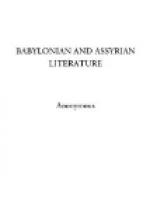This tablet describes the revolt of the gods or angels against their Creator. It seems to have been preceded by an account of the perfect harmony which existed in heaven previously. And here I would call to mind a noble passage in Job, chap, xxxviii, which deserves particular attention, since it is not derived from the Mosaic narrative but from some independent source, namely, that when God laid the foundations of the world, “the morning stars sang together, and all the sons of God shouted for joy.” By “the sons of God” in this passage are to be understood the angels. In the beginning, therefore, according to this sacred author, all was joy and harmony and loyalty to God. But this state of union and happiness was not to last. At some unknown time, but before the creation of man, some of the angels ceased to worship their Creator: thoughts of pride and ingratitude arose in their hearts, they revolted from God, and were by his just decree expelled from heaven. These were the angels of whom it is said in the book of Jude that “they kept not their first estate, but left their own habitation.” [Footnote: Jude 6.] The opinions of the fathers and of other religious writers on this mysterious subject it were useless to examine, since they admit that nothing can be certainly known about it. The opinion that one-third of the heavenly host revolted from their Creator is founded on Rev. xii. 3, where it is said: “And there appeared a dragon in heaven, having seven heads ... and his tail drew the third part of the stars of heaven and did cast them to the earth. And there was war in heaven. Michael and his angels fought against the dragon, and the dragon fought and his angels. And prevailed not: neither was their place found any more in heaven. And the great dragon was cast out—he was cast out into the earth and his angels were cast out with him,”
The Revelation of St. John was written in the first century, but some of the imagery employed may have been far more ancient, and for that reason more impressive to the religious mind of the age.
The war between Michael and the dragon bears much resemblance to the combat of Bel and the dragon recounted on a Chaldean tablet. [Footnote: See G. Smith, p. 100 of his Chaldean Genesis.] And it is not unworthy of remark that the Chaldean dragon had seven heads, like that spoken of in the Revelation. [Footnote: See 2 R 19, col. ii. 14, and my Assyrian Glossary, No. 108.]
At the creation harmony had prevailed in heaven. All the sons of God, says Job, shouted for joy. What caused the termination of this blissful state? We are not informed, and it would be in vain to conjecture. But the Babylonians have preserved to us a remarkable tradition, which is found in the tablet of page 42, and has not, I believe, been hitherto understood. It is unlike anything in the Bible or in the sacred histories of other countries. While the host of heaven were assembled and were all engaged in singing hymns of praise to the Creator, suddenly some evil spirit gave the signal of revolt. The hymns ceased in one part of the assembly, which burst forth into loud curses and imprecations on their Creator. In his wrath he sounded a loud blast of the trumpet and drove them from his presence never to return.




